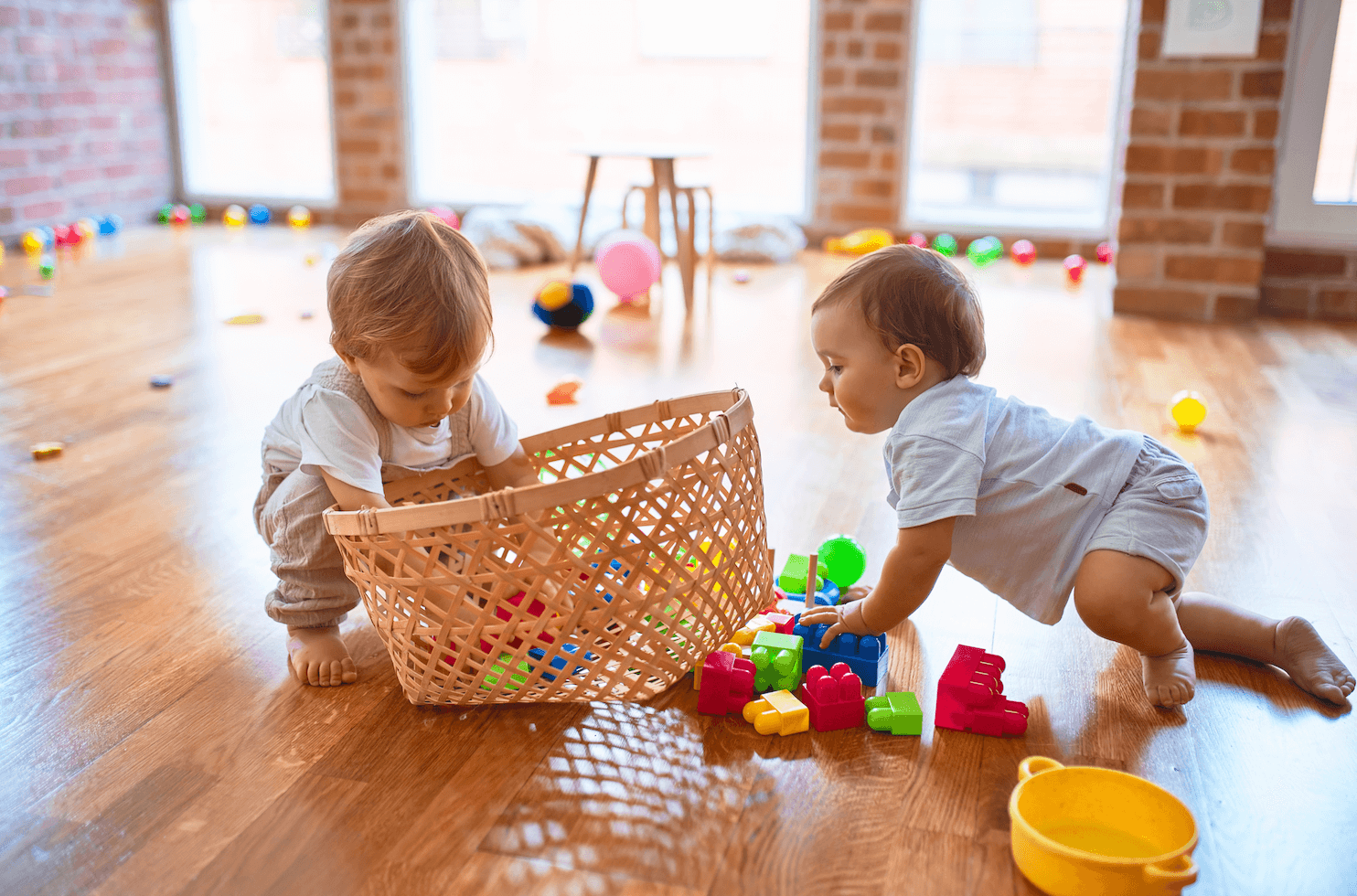Answering Common Toddler Speech and Language Questions - 1-Year-Old Q+A
Welcome to Toddler Talk! Today I’m going to provide valuable insights and answers to the most frequently asked questions about toddler speech and language development from this week’s Instagram Q+A (@toddler_talk_). I collected numerous questions from moms (and dads) just like you and picked the most common questions to include here. My goal is to help you understand and support your toddler's communication journey. So, let's dive right in and find answers to some of the burning questions you may have!
You can also skip ahead to any of the following questions using these links:
The same questions & answers are available in video format!
Top 11 One-Year-Old Parent Questions
1. Does a word need to be said daily to count as a word?
No, your toddler doesn't have to say a word every day for it to count.
What matters is consistency, independence, and intentionality. For a word to be counted, your little one should use it consistently, meaning you should hear them say it about 3-5 times before considering it as a word. They should say it independently, without you saying it first, and with intention, such as using the word to communicate a specific purpose or message.
For example, if they say "ba" on their own to let you know they see a bird 3 times in a week, you can count it as a word.
Learn Even More Here: What counts as a word?
2. How many words should my 14-month-old have?
At 14 months, you can listen for at least one word from your baby.
Typically, a baby's first word appears between 10-14 months. It's important to remember that each child develops at their own pace, so the number of words may vary. However, if you have concerns about your child's language development, consult with a speech therapist or pediatrician for further guidance.
Learn Even More Here: My 14 month old doesn’t talk yet, should I be worried?
3. My 18-month-old says some words backwards. Is that normal?
It's not uncommon for toddlers to have difficulty pronouncing certain words as they navigate the early stages of speech development, and every toddler’s speech errors will be a little different. At 18 months, their pronunciation skills are still evolving.
It's normal for toddlers to make short-lived quirky errors, like saying words backwards. However, if these errors persist for more than a month or so, it's advisable to discuss your concerns with your pediatrician and consider monitoring your child's progress together.
And keep in mind, some pronunciation errors will persist into the preschool or even elementary school years. So when in doubt, asking a speech therapist to listen to your child’s speech can be really helpful!
Additional Resource: How to find a pediatric speech therapist in my area
4. My son is 18 months old and just recently started saying more than 5 words, but he no longer says "Mama." Is this normal?
When toddlers stop saying words they used to say, it's referred to as "language regression" by speech therapists. It's important to note that all children will experience language regression to some extent during their development.
The best approach is to remain calm and not draw too much attention to the fact that your child has stopped saying a particular word. You can continue to use your name, "Mama," when you're playing or going about your daily activities. Listen for your child to start saying "mama" again in a few days or weeks. If the word doesn't return within a couple of weeks, it may be worth discussing with your pediatrician.
Additionally, I've included a resource below that provides further information on the difference between language regression as a part of typical development and when additional support may be needed.
Learn Even More Here: My toddler stopped saying words they used to say…
5. Is it normal for a 19-month-old to say three-word sentences?
Sure. It's absolutely normal for toddlers to show a wide range of language skills at this stage.
Most 19-month-olds may be using single words, while some may already be combining words to form short phrases or sentences.
It's important to remember that phrases that are consistently said the same way, like "I love you" or "thank you," are considered as one word (or one idea) for most one-year-olds. As they continue to develop, they will start combining words in new and creative ways, that’s when these memorized phrases count as more than one word.
Learn Even More: 18 month old speech & language milestones
6. How can I encourage my 20-month-old to start putting words together?
Encouraging your toddler to combine words is an exciting milestone in their language development. If your little one is already saying around 50-100 words independently, you can start practicing word combinations (If not, focus on building their vocabulary first!).
Here are a few tips to help them along:
Add to what they've already said to provide examples of word combinations. For example, if they say "Daddy," you can expand it by saying, "Daddy, look!" or "Daddy, stop," depending on the situation.
Model phrases instead of questions. Using phrases like "more water!" instead of asking "more water?" increases the likelihood of them imitating the phrases.
Introduce a variety of word combinations. Combine two words they already say on their own to showcase different combinations and expand their language skills.
For more detailed tips and free activities to support your toddler's language development, check out the resource linked below.
Additional Resource: Teaching toddlers to put 2 words together
7. At what point do toddlers start using pronouns? My 20-month-old hasn't started.
Toddlers typically begin using some pronouns when they are one. Common pronouns that babies often say first are "me" and "that."
If your child hasn't started using pronouns yet, you can teach them one at a time, starting with simple ones like "you" or "me." Use gestures alongside the pronouns to enhance understanding, such as pointing to the person you're referring to. Incorporating pronoun-focused books can also be helpful in teaching and reinforcing pronoun usage (For a list of my favorite books for teaching pronouns, be sure to click the link below!)
Learn More Here: Teaching toddlers pronouns and book list
8. My 21-month-old says everything as a question like "Do you want down?" or "Is it tasty?" Is this normal?
I have a couple of ideas. This could just be a phase as toddlers go through various "odd" phases while learning to talk.
However, it could also be a result of you unknowingly asking your child a lot of questions, which they may be copying. To address this, I have an amazing activity guide that can help you analyze the number of comments versus questions you use around your little one (link here). It offers practical suggestions to change the way you talk, encouraging more comments than questions. Taking baby steps can greatly benefit your child's language development!
Get the activity guide: Making more comments, asking less questions
9. My 21-month-old pronounces "S" with a lisp. Will this vanish with age?
At 21 months, there's no need to worry about lisping or spend time actively teaching the correct pronunciation of the "S" sound.
Lisping, where toddlers produce sounds in the front of the mouth instead of the back, is a common phonological process seen in this age group. It typically resolves naturally by elementary school. However, if you have concerns or want to learn more about common speech errors in toddlers, I recommend referring to the linked blog post on toddler speech speech sounds by age.
Learn More Here: Speech sounds by age - developmental milestones for speech sounds
10. My 21-month-old often pronounces a new word properly at first, but then it's like they get lazy and the pronunciation changes. Is this normal?
It's probably not that they are being lazy. When toddlers are learning new words, they typically say them in isolation or by themselves, which makes it easier to pronounce them correctly. However, when they start using the words in combination with others, the pronunciation can become more challenging.
Additionally, when they say a word on their own without copying your pronunciation, it may be less accurate because they haven't heard the exact pronunciation from you.
It's important to note that pronunciation errors are common in toddlers. I will link a guide on toddler speech "errors" in the notes section for you to compare with what you're hearing at home.
Resource: Common toddler speech mistakes you don’t need to worry about
11. My 23-month-old says "T" instead of "C/K" sounds. For example, they say "blat" instead of "black." Is this normal?
Yes, it's normal! In speech therapy, we use the term "phonological process" to describe toddler speech errors.
The specific error your child is making is called "fronting," where they produce sounds in the front of the mouth instead of the back. It's common for toddlers to substitute a "T" sound for a "K" sound and a "D" sound for a "G" sound. The process of fronting usually resolves on its own by around age 4.
If you're interested, you can check out the linked toddler speech errors blog post for information on other common errors.
Learn more here: Expected toddler speech “errors”
Navigating your toddler's speech and language development can be both exciting and challenging. By understanding their milestones and knowing what to expect, you can provide the support and encouragement they need to thrive. Remember, each child develops at their own pace, and it's essential to celebrate their progress along the way. If you have any further questions or concerns, don't hesitate to reach out to a speech therapist or pediatrician for professional guidance. Stay tuned for more valuable information and resources on Toddler Talk, your trusted partner in your child's communication journey.
You might also enjoy these recent blog posts:
Written By: Stephanie Hatleli, MS CCC-SLP
© 2020-2025. Stephanie Hatleli, MS CCC-SLP. All Rights Reserved.
The content offered on ToddlerTalk.com is for informational purposes only. Toddler Talk is not engaged in rendering professional advice, whether medical or otherwise, to individual users or their children or families. No content on this site, regardless of date, should ever be used as a substitute for direct medical advice from your doctor, speech language pathologist, or other health professional. By accessing the content on ToddlerTalk.com, you acknowledge and agree that you are accepting the responsibility for your child’s health and well-being. In return for providing you with information related to home speech and language practice, you waive any claims that you or your child may have as a result of utilizing the content on ToddlerTalk.com.









Explore language tips for potty training tailored to your child's communication stage. From toddlers who are just beginning to talk to children speaking in sentences, learn how to use gestures, sign language, storytelling, and consistency to support your potty training journey.